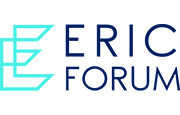
The ERICs (European Research Infrastructure Consortia), under the umbrella of the ERIC Forum, represent one of the leading science policy voices in Europe and play a key role in structuring the research infrastructure landscape. Following the successful set-up and implementation of the ERIC Forum (2019-2022), further efforts are needed to consolidate its achievements and expand the coordination and monitoring of the ERICs. This project aims to structure the cooperation between ERICs, support the implementation of the ERIC Regulation and ERICs services, and consolidate the integration of the ERICs in the European Research Area by deepening the ERIC Forum’s contribution to research policies.
To reach its objectives, the project relies on a multi-disciplinary consortium involving all identified ERICs, both multi and single-sited, and representing the five science clusters of the ERICs. The project is structured in four thematic pillars: 1) Monitoring and Reporting, 2) Reinforcing European research infrastructure policy and international cooperation; 3) Implementing the ERIC Regulation, strengthening capacities and identifying possible shared resources; 4) Coordinating the project, ERIC Forum Executive Board secretariat and communication.
The activities carried out within the project will ensure the implementation of specific results on three key target groups: the ERICs and ERICs-to-be, in order to increase their knowledge and propose solutions for key aspects of the ERIC Regulation implementation; the policy-makers and stakeholders by setting-up and managing the new ERIC Forum monitoring and reporting platform, thus ensuring an easy access to updated and consolidated data and information about the ERICs, as well a further strengthened role in the European science policy; and finally the users, as the project will investigate the sustainability and open access of its services, as well as address the challenges related to the commercial aspects of service provision.
LifeWatch ERIC main involvement is in WP8: Towards the green and digital transition.